A fall may be a warning sign of declining health. It is not normal to fall even as our body ages. Falls can lead to injury, hospitalisation and death. They are also a major cause of disability and institutionalisation. As such, preventing falls is vital to remain healthy and independent.
Here are six tips to prevent falls, click to find out more about each tip.
-
Check Your Vision
-
Proper Footwear
-
Home Safety
-
Regular Exercise
-
Seek Treatment for Postural Hypotension
-
Keep Your Bones Healthy
1. Check Your Vision
Eyesight changes with age. Poor vision may increase the risk of falling as you may have difficulty navigating uneven ground, and fail to spot nearby hazards and obstacles. The effects of poor vision can be reduced with the following tips:
Lighting
- Ensure your environment is well lit at all times. Lighting is important to prevent slips, trips and stumbles.
- When moving to a dimmer area, allow your eyes to adjust to the dimmer lighting.
Glasses
- If you are short-sighted, wear your glasses when walking.
- Avoid multifocal lenses which can impair depth perception and contrast sensitivity, especially when walking outdoors.
- Ensure that you have your eyes checked every one to two years, and update your glasses when necessary.
Check your eyesight regularly
- See your polyclinic doctor if you are having problems with your vision. If required, the doctor may refer you to an eye specialist. If you have cataracts, surgery may be able to improve your vision and reduce the risk of falling.
2. Proper Footwear
The shape of our feet changes as we get older, impairing balance and the way we walk. Pain and foot swelling can also make it difficult to walk. Choosing the right footwear is essential to minimise the risk of dangerous falls.
Here are some tips for choosing shoes that are suitable for the elderly:
- Look for shoes that have a firm heel counter (i.e. support) with rounded edge for better support when walking.
- Look for shoes that have velcro, buckle or laces to hold the foot firmly in place. Ensure that laces are securely fastened while the shoes are being worn.
- Shoes with low, broad and slip-resistant heels are ideal to maximise contact with the ground and prevent slipping. Check the sole regularly to ensure it is not worn out.
- The front of the shoe should be deep and wide enough to accommodate toes comfortably, but not too loose.
- Ensure that the shoe is of correct length to allow normal foot function. There should be a one-thumb spacing between the longest toe and the shoe liner.
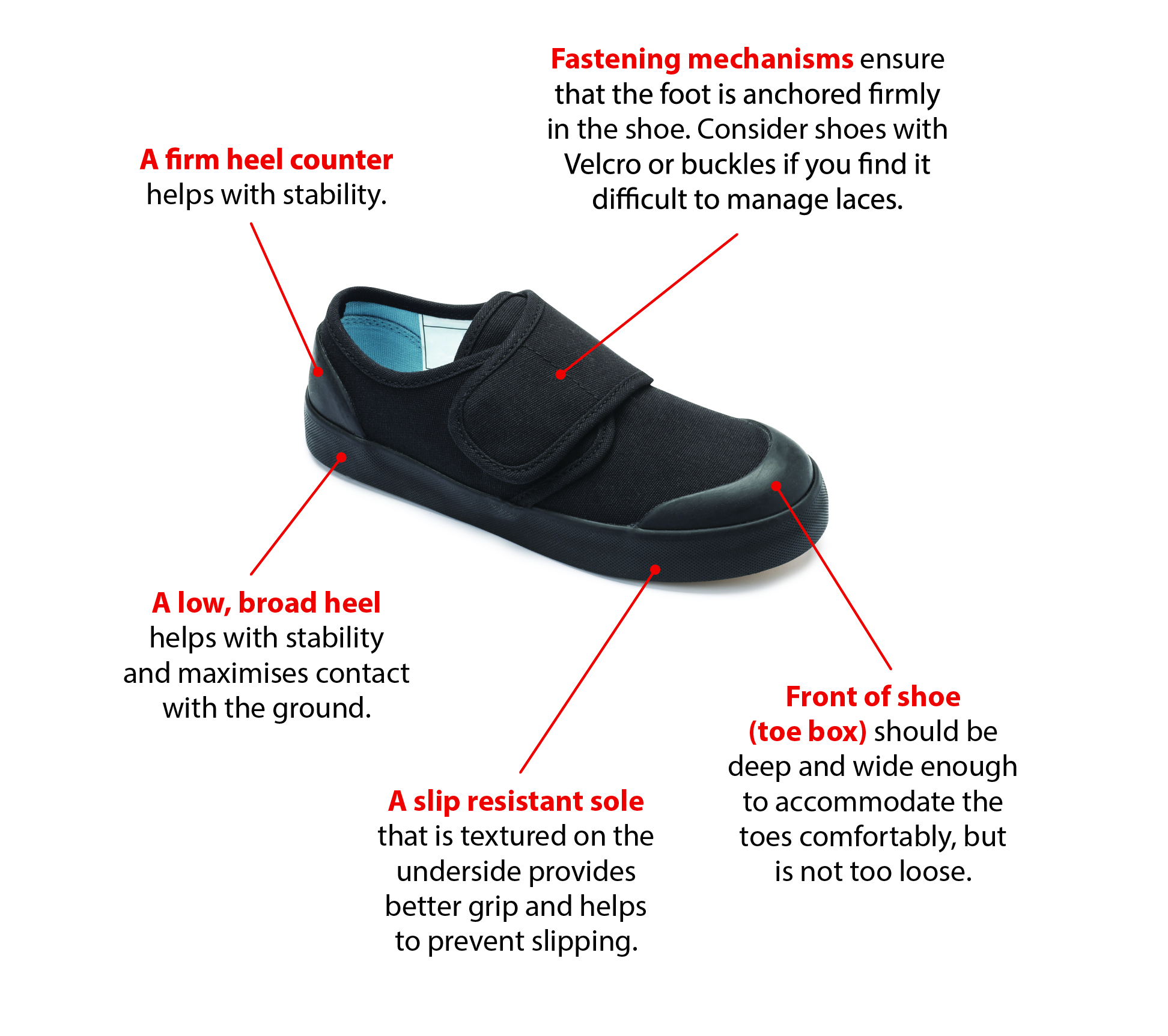
- Avoid high-heels, floppy slippers and slick-soled shoes as they may increase the risk of falling.
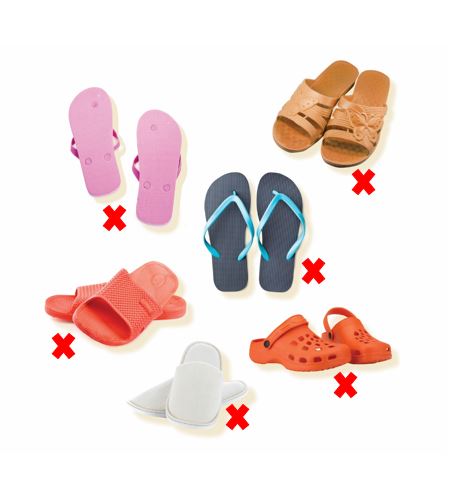
When buying shoes, look out for the following:
- Try both shoes on and walk around the shop to ensure that the shoes fit properly and that you are comfortable in them.
- Feet tend to swell during the day, hence shop for shoes in the afternoon when your feet tend to be the largest.
Check that clothing (pants, dresses and long skirts) end above the ankle to avoid tripping.
Sit down rather than stand when putting on your shoes or dressing.
If you have painful and swollen feet, or experience numbness and tingling sensations in your feet, see a doctor or podiatrist.
3. Home Safety
60% of falls happen at home. In order to continue to live safely and independently, our homes have to ‘grow’ with us. The environment in your home can also be modified to reduce the risk of falling.
Improve visibility
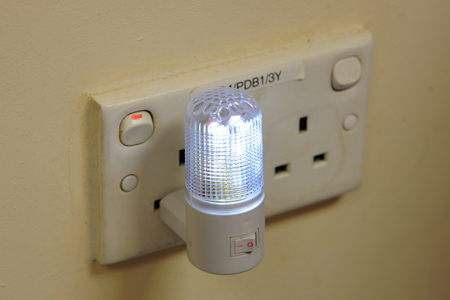
Install a night light so that you do not walk in the dark at night.
- If there are steps in your home, make them more visible by marking the edges with contrasting anti-slip tape.
Ensure there is good lighting over table tops and other work areas. Have sufficient, non-glaring lighting over the counter top and stove, especially when food is being sliced or cut.
Keep the floor clean and dry
- Keep the floor dry and clean up any spills immediately to prevent slipping on wet surfaces.
- Lay non-slip mats on the toilet or bathroom floor. If you are using doormats, ensure that they are lined with anti-slip lining, and that their edges remain flat.
Remove obstacles
- Keep your environment clutter-free.
- Do not leave loose rugs/cloth on the floor.
- Make sure there are no electrical cords lying around the area where you walk. Secure loose wires to the floor or wall.
- Organise your furniture so that you have a clear walkway at home.
- Make sure long-handled utensils are turned inwards when cooking to avoid accidental spillage.
Ensure easy access to frequently used items
- Place frequently used items in easy to reach places (e.g. keep glasses on the bedside table).
- Store heavy items within easy reach or in lower cabinets.
- Avoid standing on stools or chairs to reach high shelves.
Equipment
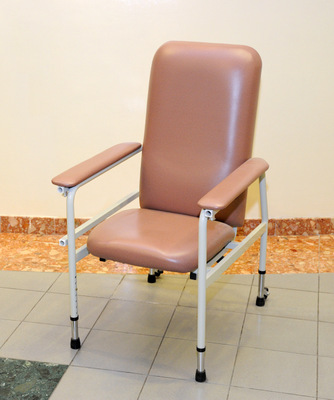
- Do not place hot or sharp items near the edge of the tables/shelf.
- Consider using toileting aids, such as a urinal or commode, if you get up to use the toilet frequently at night.
- Avoid squatting toilets. Install a sitting toilet or use a commode chair.
- Sit on a stable shower chair with back support while showering.
- Install grab bars and/or use a raised toilet seat if you have difficulty getting on and off the toilet
- Use non-slip mats in the bathroom or install slip-resistant flooring
- Ensure that bed and chairs are of a correct height. You should be able to place your feet flat on the floor when you sit at the edge of the bed or on the chair with knees bent at 90 degrees.
You may wish to consult an occupational therapist for professional advice on suitable home modification and equipment.
Resources:
https://www.hdb.gov.sg/cs/infoweb/residential/living-in-an-hdb-flat/for-our-seniors/ease
4. Regular Exercise
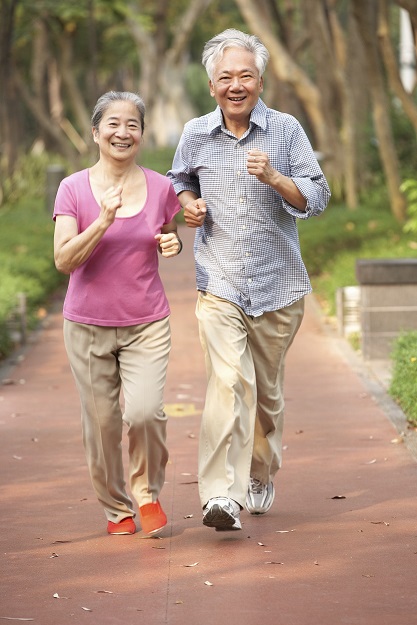
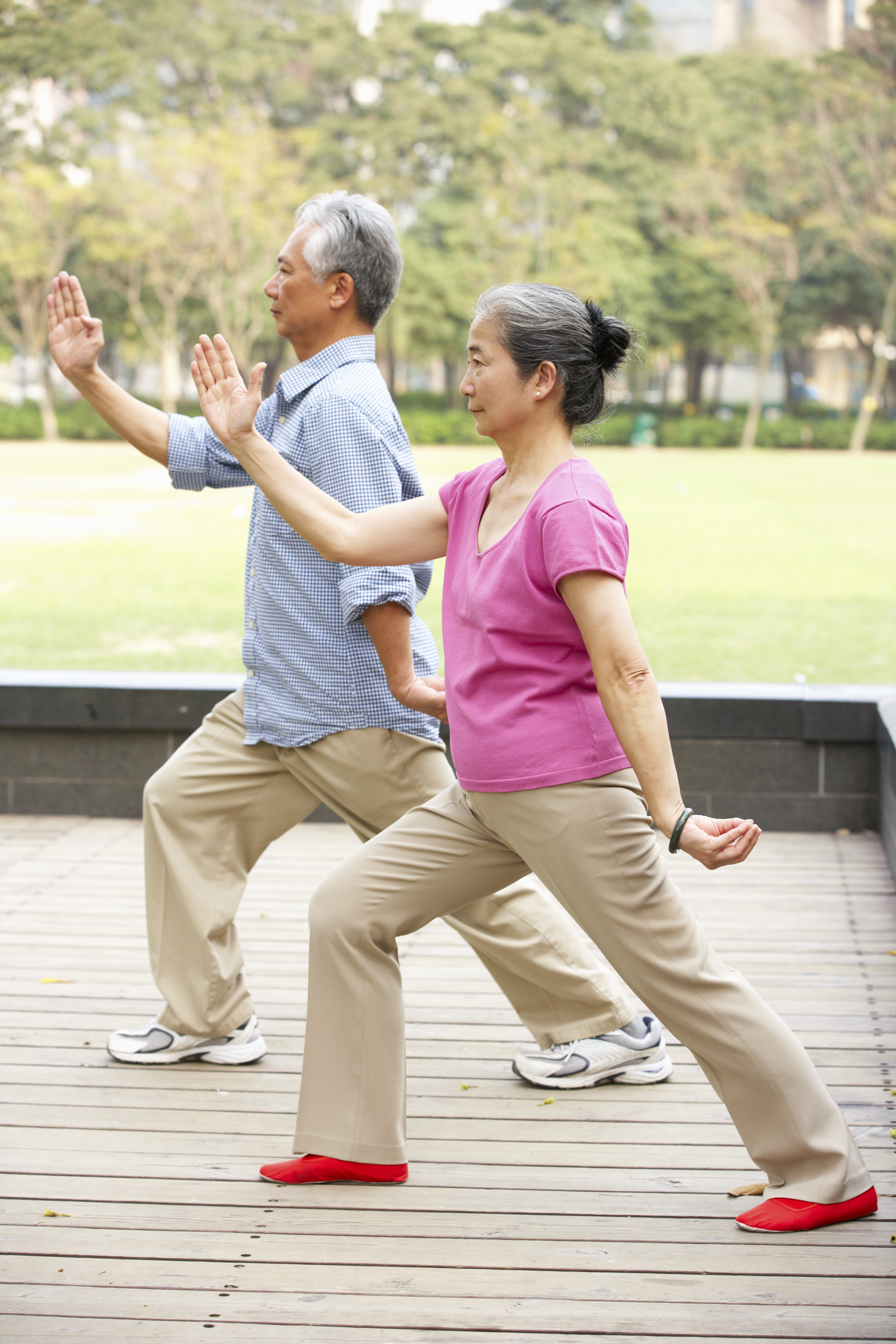
We lose muscle strength and our sense of balance as we age. Staying active helps strengthen our muscles and maintain balance, reducing our risk of falls.
For a start, incorporate more movement into your daily routine. Improve your endurance and energy levels by going for regular walks at a comfortable pace for at least 180 minutes every week. If that seems too overwhelming, try to remain active with day to day activities such as housework or gardening.
Look for a fitness program catered to seniors that includes resistance and balance exercises. Activities such as Tai Chi has been shown to reduce the risk of falls in older adults. Other activities such as dancing, yoga and gym sessions can also improve strength and balance.
It is important to pace yourself. You do not have to do all the activities in one session. Instead, you can have active sessions throughout your day in 10 to 15 minute windows.
Do remember to wear proper attire and keep yourself hydrated when exercising. You can consult your doctor if you are unsure on what activities suit your lifestyle. Age should not be a barrier to exercising. If in doubt, you can talk to your doctor.
Resources:
https://www.myactivesg.com/Programmes/For-Masters-and-Seniors
No Falls Video Resources
https://www.healthhub.sg/programmes/83/healthy-ageing-exercise-step-by-step-guide
5. Seek treatment for postural hypotension
Postural hypotension is a drop in blood pressure which occurs when rising from a sitting to standing position. This may make you feel giddy, light-headed or faint, which can result in falls. Other symptom of postural hypotension include headaches, blurring of vision, nausea, weakness and fatigue when standing.
Here are some tips to reduce these symptoms:
Hydrate
- Drink two glasses of water in the morning after waking up.
- Drink six to eight glasses of water each day, unless you have been told to limit your fluid intake.
Movement
- When getting out of bed, do so gradually. Wait a few minutes in between each position (i.e. sitting to standing).
- Do some simple stretching exercises before getting up (e.g. move your feet up and down) and after standing (e.g. marching on the spot).
- Make sure you have something to hold onto when you stand up.
- Only change your position or start walking when you do not feel giddy or faint.
Sleep
- Sleep with extra pillows to raise your head.
Sit down
- Try to sit down whenever possible while doing activities such as showering, dressing, or working in the kitchen.
Medications
- Certain medications, particularly those for treating high blood pressure, may contribute to postural hypotension. Do check with your doctor if any medications need to be reduced, stopped or started.
6. Keep your bones healthy

Osteoporosis is a condition where the bones become weak and prone to fractures. This condition is also more common in the elderly. Osteoporotic fractures can result in chronic pain, reduced mobility and loss of independence. Treating osteoporosis can reduce the risk of sustaining an osteoporotic fracture should you fall.
Osteoporosis is diagnosed through a Bone Mineral Density (BMD) test. This test is recommended if you:
- are male and aged 65 years and above
- are female and post-menopausal
- have had a fall before
- are on steroid treatment(s)
- are post-menopausal
- have low body weight
If you have osteoporosis or if you have had a fracture after a minor fall, you should also be considered for osteoporosis treatment. Discuss the different treatments options with your doctor.
Some other ways to improve your bone strength include:
- Engaging in regular exercise. Aerobics, brisk walking, and weight training are examples of resistance and muscle-strengthening exercises that can help improve bone density.
- Taking more calcium to maintain strong and healthy bones. Calcium-rich foods includes dairy products (i.e. milk, cheese, and yogurt), dark leafy greens (i.e. spinach, collard greens) and fish with small bones (i.e. sardine, anchovies).
- Improving vitamin D levels with oral supplements or through your diet (i.e. eggs, fish, low fat milk and margarine)
- Adequate vitamin D through adequate sun exposure can also help the body to absorb calcium and improve muscle function.
Seeking Medical Help
Not sure of your fall risk? Seek help with Changi General Hospital’s Fall Assessment Clinic. The holistic healthcare team of nurses, physiotherapists, doctors and occupational therapists can help to assess your fall risk and on what precautions to take.
To make an appointment, please ask a doctor to refer you through the
CGH Appointment Centre: 6850 3333.
< Back to Health Library
